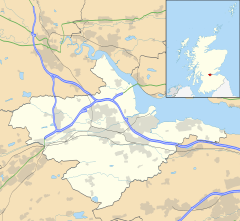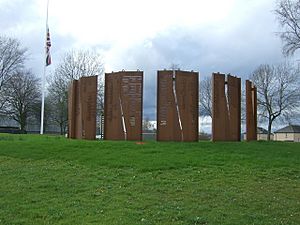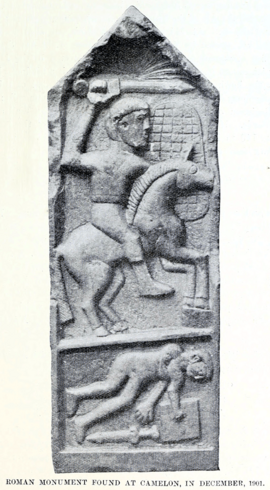Camelon facts for kids
Quick facts for kids Camelon
|
|
|---|---|
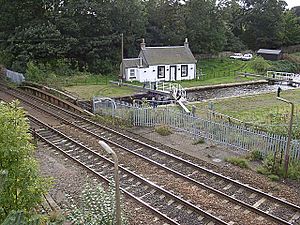 Camelon swing bridge over the Forth and Clyde Canal at Camelon lock |
|
| Population | 4,508 (2001 census) |
| OS grid reference | NS867805 |
| • Edinburgh | 24.7 mi (39.8 km) ESE |
| • London | 346 mi (557 km) SSE |
| Civil parish | |
| Council area | |
| Lieutenancy area |
|
| Country | Scotland |
| Sovereign state | United Kingdom |
| Post town | FALKIRK |
| Postcode district | FK1 |
| Dialling code | 01324 |
| Police | Central Scotland |
| Fire | Central Scotland |
| Ambulance | Scottish |
| EU Parliament | Scotland |
| UK Parliament |
|
| Scottish Parliament |
|
| Website | falkirk.gov.uk |
Camelon is a large town in the Falkirk area of Scotland. It's located in the Forth Valley. The town is about 1.3 miles (2.1 km) west of Falkirk. It is also 1.3 miles (2.1 km) south of Larbert. About 2.6 miles (4.2 km) east of Camelon is Bonnybridge. The main road through Camelon is the A803 road. This road connects the town to Falkirk. In 2001, Camelon had a population of 4,508 people.
Contents
History of Camelon
Ancient Times
People lived in the Camelon area even before the Romans arrived. Old items from the Bronze Age have been found here. These items were discovered in ancient graves.
Camelon was an important place for the Romans. They built several forts here between 80 and 83 AD. Some historians think Camelon was the southern fort of the Roman Gask Ridge. This ridge was a line of forts. It helped separate the Highlands from the Lowlands.
The Roman fort was less than a mile north of the Antonine Wall. The Antonine Wall was a big barrier built by the Romans. An old Roman altar was found near the fort. It was discovered at Bogton Farm. A special Roman plate was also found. You can see it at the Hunterian Museum in Glasgow.
Canals and Industry
Camelon grew a lot when canals were built in the 1700s and 1800s. The Forth and Clyde Canal opened in the 1770s. This was after the Carron Iron Works started. The Union Canal opened later, in 1822. It brought boats and goods from Edinburgh to Port Downie. This is where the two canals met.
A few decades later, railways also came to Camelon. In 1831, about 809 people lived in the village. Many men and boys worked making nails. Other old industries included processing tar and chemicals. There was also a shipbuilding business. A distillery called Rosebank was also in Camelon.
In the early 1900s, W. Alexander & Sons started a bus service here. They also built bus bodies in Camelon. A series of locks connected the Union Canal with the Forth and Clyde Canal. This brought a lot of business to the town. In 2002, the locks were replaced. A giant rotating boat lift called the Falkirk Wheel took their place.
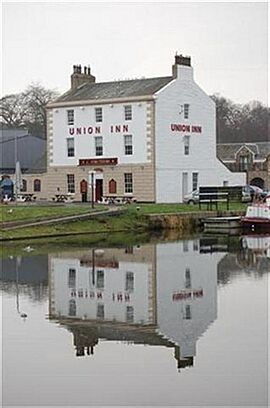
Mariners of Camelon
People from Camelon are often called "Mariners." This name is remembered by the Mariner Leisure Centre. It is also celebrated on Mariners' Day. Mariners' Day is a fun children's fair. It happens every year on the second Saturday in June. The day includes a parade. There is also a crowning ceremony for a Queen. It's a day full of games and fun for the children of Camelon.
Getting Around Camelon
Camelon has good transport links for its size. Camelon railway station is on two train lines. These are the Cumbernauld Line and the Edinburgh to Dunblane Line. The Mariner Leisure Centre is right next to the station. The main road in Camelon is the A803 road. This road helps people travel to Falkirk.
Sports in Camelon
Camelon is home to a football club called Camelon Juniors. They play their games at Carmuirs Park. This park is next to the Forth and Clyde Canal. The club started in 1920.
Images for kids
-
Map showing forts and fortlets along the Antonine Wall.
 | Misty Copeland |
 | Raven Wilkinson |
 | Debra Austin |
 | Aesha Ash |


